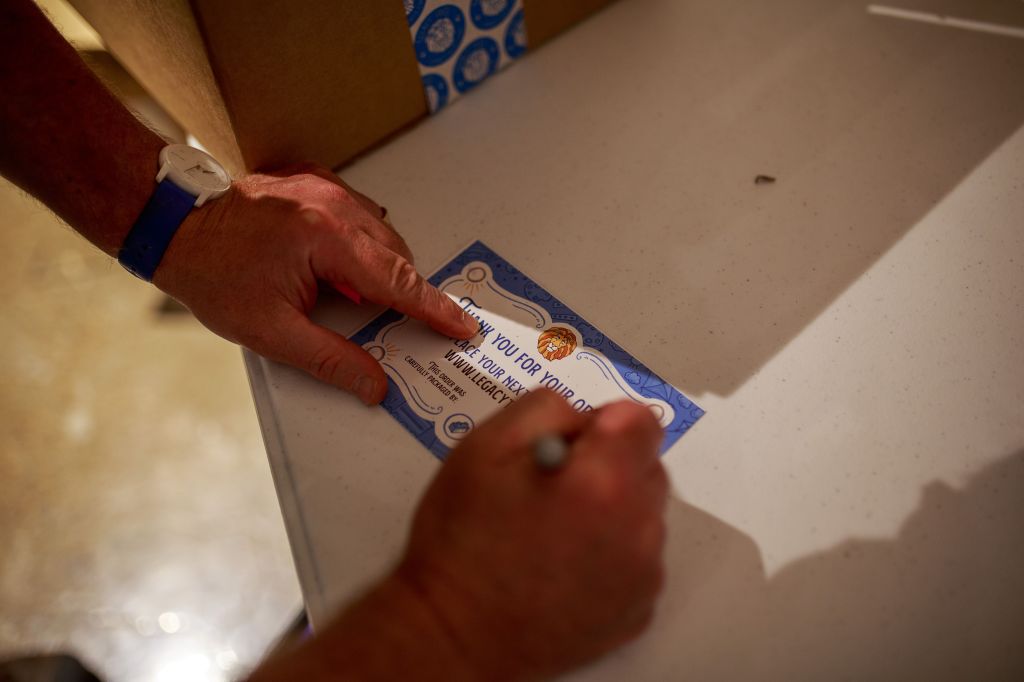Subscribe to How To Reopen, our weekly newsletter on what it takes to reboot business in the midst of a pandemic.
It was in mid-March when the orders came to shut down stores.
For business owners like Brad Ruoho, who owns Minnesota-based toy store Legacy Toys, the pandemic was especially brutal. He founded the now-seven store company in 2012 in the Northwoods of Minnesota with a key focus: It’s “very interactive, hands-on, lots of stuff for the kids to do,” he tells Fortune. In fact, “In our first store, we had a full tree we built in the middle of the store and we built a saltwater aquarium.” Interactive installments like those feature prominently in Ruoho’s 7,500 square-foot store in the Mall of America—a way to entice kids to have “more hands on play, interactive play, rather than just all video games,” he says.

Three new locations had been open for less than a year when the order came to shut down. Ruoho’s employee count dropped from around 80 to only four across seven stores as he furloughed most of the staff. Ruoho says he had to quickly pivot his business and accelerate plans (which were already in motion before the pandemic) to build an online store immediately.
“Fortunately we were able to launch the new website quickly and it just instantly turned into thousands and thousands of sales happening all the time. Then we were pivoting to figure out, how do we ship all of this stuff? How do we package all this up? We quickly adapted and tried to make it work,” he says. In addition to fast-tracking plans to launch a website, Legacy Toys (like many retail stores) has started doing curbside pickup and even having employees deliver within a 10-mile radius of their stores, which reopened in the middle of June.
But the pivot likely wouldn’t have be possible without financial help to bring back employees to work on the company’s new website.
Built as a bridge loan for small businesses to ride out the shutdowns, the Small Business Administration’s $670 billion Paycheck Protection Program was set up hurriedly to give small businesses forgivable loans up to $10 million each. But the program has been engulfed in controversy nearly from the onset, as many small businesses were initially shut out of the program while funds went to large, (in some cases) publicly-traded companies. Still, the program has thus far doled out emergency loans (which can be converted into grants if used properly) to nearly 5 million businesses.
Legacy Toys applied “right away” for a PPP loan, and received $160,000. According to Ruoho, the loan was “a huge piece of what has been able to keep us going.”
After Legacy Toys launched the new site, early sales plus the PPP loan allowed the company to bring back roughly 60% of their pre-COVID workforce, says Ruoho. Since the online store took off, Ruoho says he’s hired new jobs in IT and marketing to help boost the growing new part of their business. Indeed, Ruoho says Legacy Toys is now shipping internationally for the first time, to customers who “have never heard of us before” and found the company through Google Shopping and other channels. In fact, the website sales now equal Legacy Toy’s pre-pandemic sales across all of their stores.
“We grew so quickly from literally shipping nothing to shipping several hundred packages a day,” he notes. One hot seller, says Ruoho: “We were just shipping ridiculous loads of puzzles—500, 600 puzzles a day.”

Yet while the federal loan (and gumption of his employees) has helped Ruoho’s business muscle through the pandemic thus far, what happens next is still up in the air. The fate of malls and retail stores is a question mark as cases keep spiking across the country, and Ruoho still hasn’t been able to rehire all of his employees.
But Ruoho is determined to make the best of things in the meantime—He says the company is working with educators to develop a curriculum and products for the slew of families who expect to be homeschooling their children come fall.
“We see that as an opportunity and necessity for parents. We can be a resource for them and help them out,” he says.
More must-read finance coverage from Fortune:
- Meet the one-branch bank that did more PPP lending than Citi
- Are we seeing a “reverse square root” symbol economic recovery?
- “A real bind”: Banks that carry out Trump’s new sanctions could violate Hong Kong security law
- The best and worst places in the U.S. to invest in real estate during the pandemic
- Why slashing product prices is usually a terrible idea
* This article was originally published here
No comments:
Post a Comment
Your comments, questions or critique is more than appreciated.